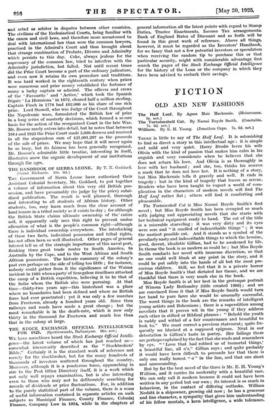THE HANDBOOK OF SIERRA LEONE. By T. N. Goddard. (Grant
Richards. 10s. 6d.) THE Government of Sierra Leone have authorized their Assistant Colonial Secretary, Mr. Goddard, to put together
a volume of information about this very old British pos- session, and have presumably (to judge by the price) subsi- dized publication. The result is well planned, thorough and interesting to all students of African history. Other students, too, may learn much from the clear account of land tenure in a tribal society as it exists to-day ; for although the British State claims ultimate ownership of the' entire soil, it apparently only uses this right to prevent undue alienation of what is the people's common right—although there is individual ownership everywhere. The interlocking of these two facts, individual possession and tribal rights, has not often been so well illustrated. Other pages of general interest tell us of the strategic importance of this naval port, flanking three great trade routes to South America, to Australia by the Cape, and to the West African and South African possessions. The historic summary of the colony's past errs perhaps on the side of telling too little ; for instance, nobody could gather from it the significance of the Waima incident in 1893 when a party of Senegalese tirailleurs attacked the camp of a British expedition, believing it to be that of the Sofas whom the British also were pursuing. At that time—thirty-two years ago—this hinterland was a place where no boundaries had been defined and where no British force had ever penetrated : yet it was only a few marches from Freetown, already a hundred years old. Since then railways and roads have made a great change ; but the most remarkable is in the death-rate, which is now only thirty in the thousand for Freetown and much less than that in the colony at large.










































 Previous page
Previous page